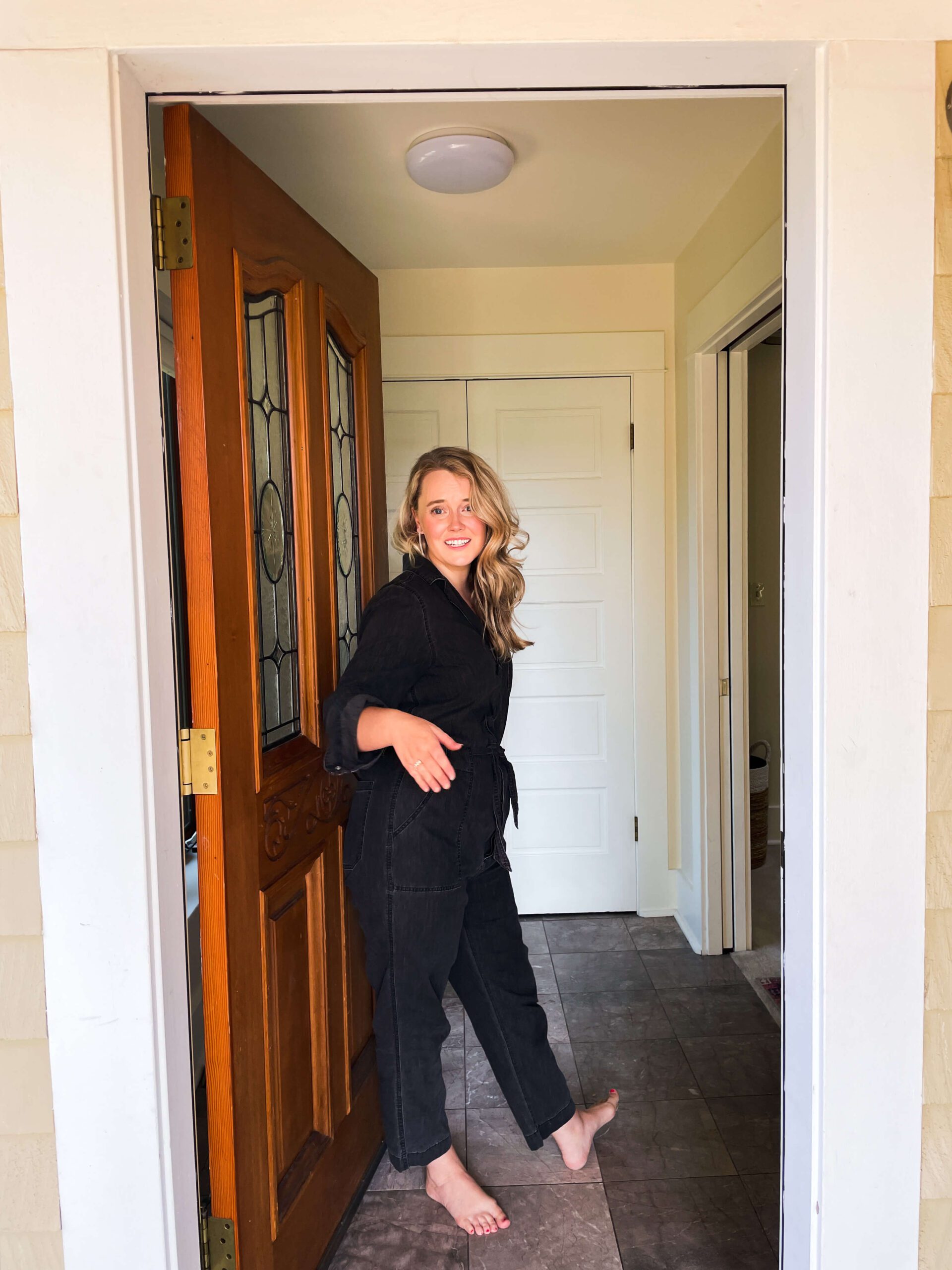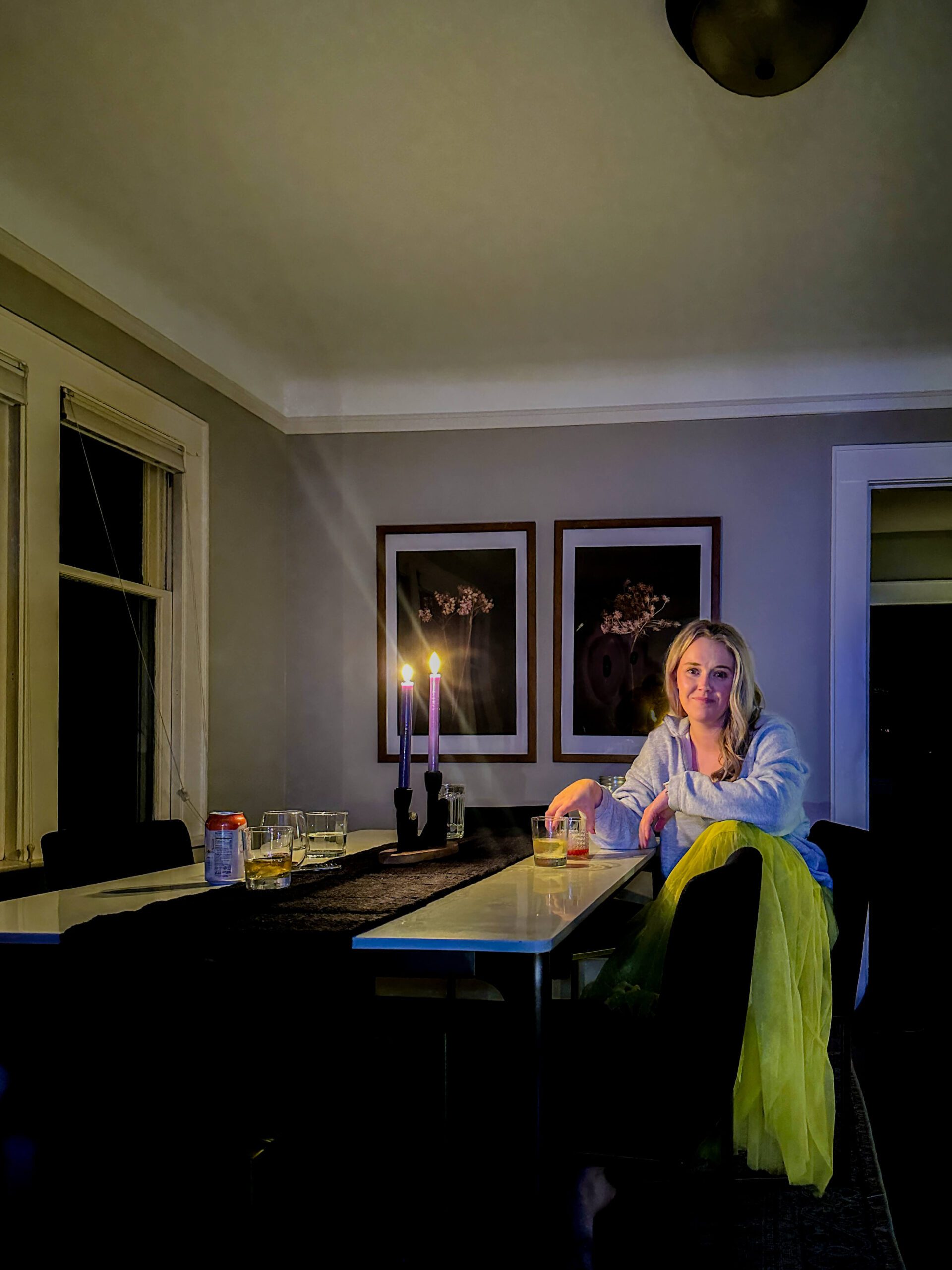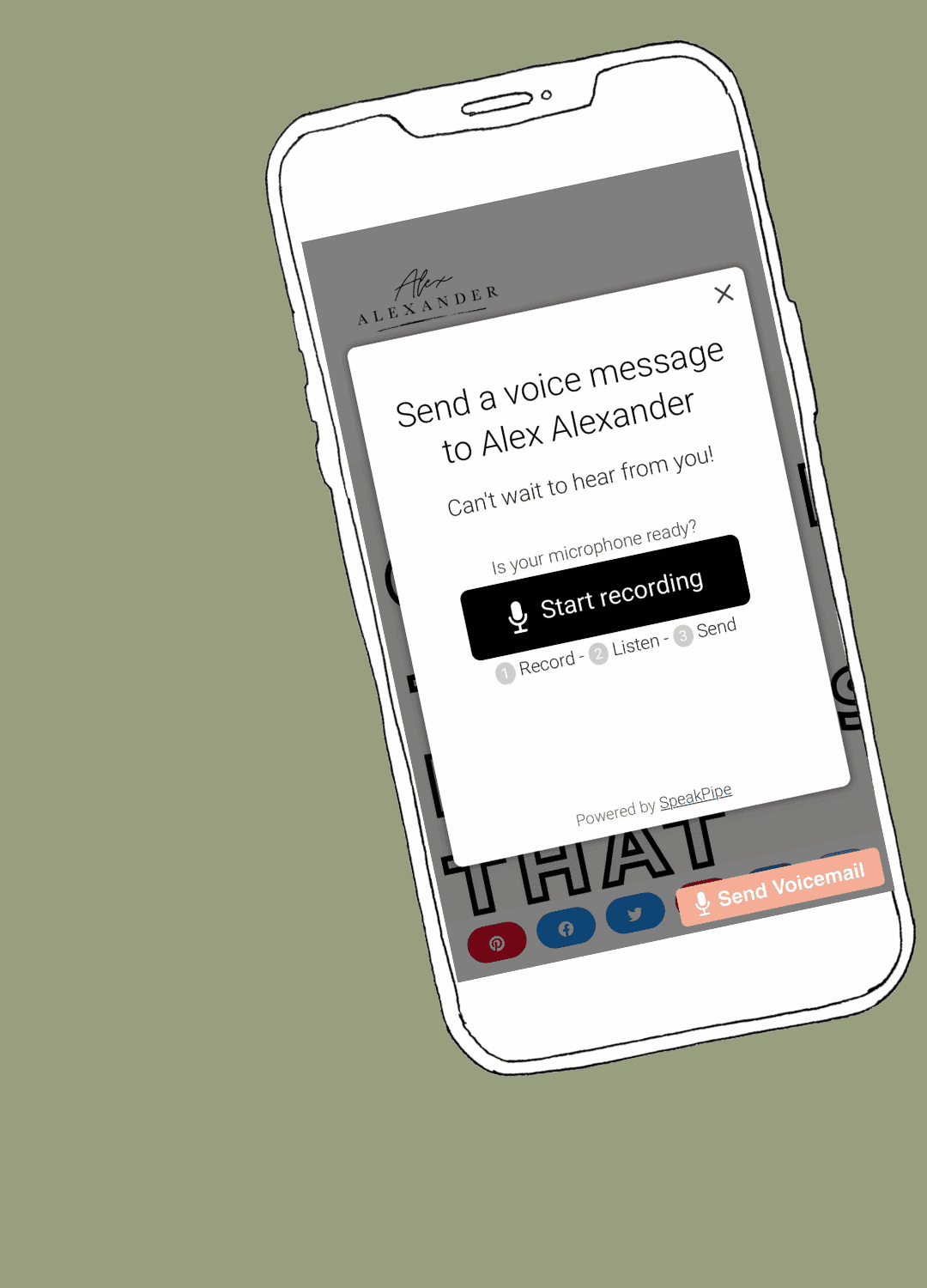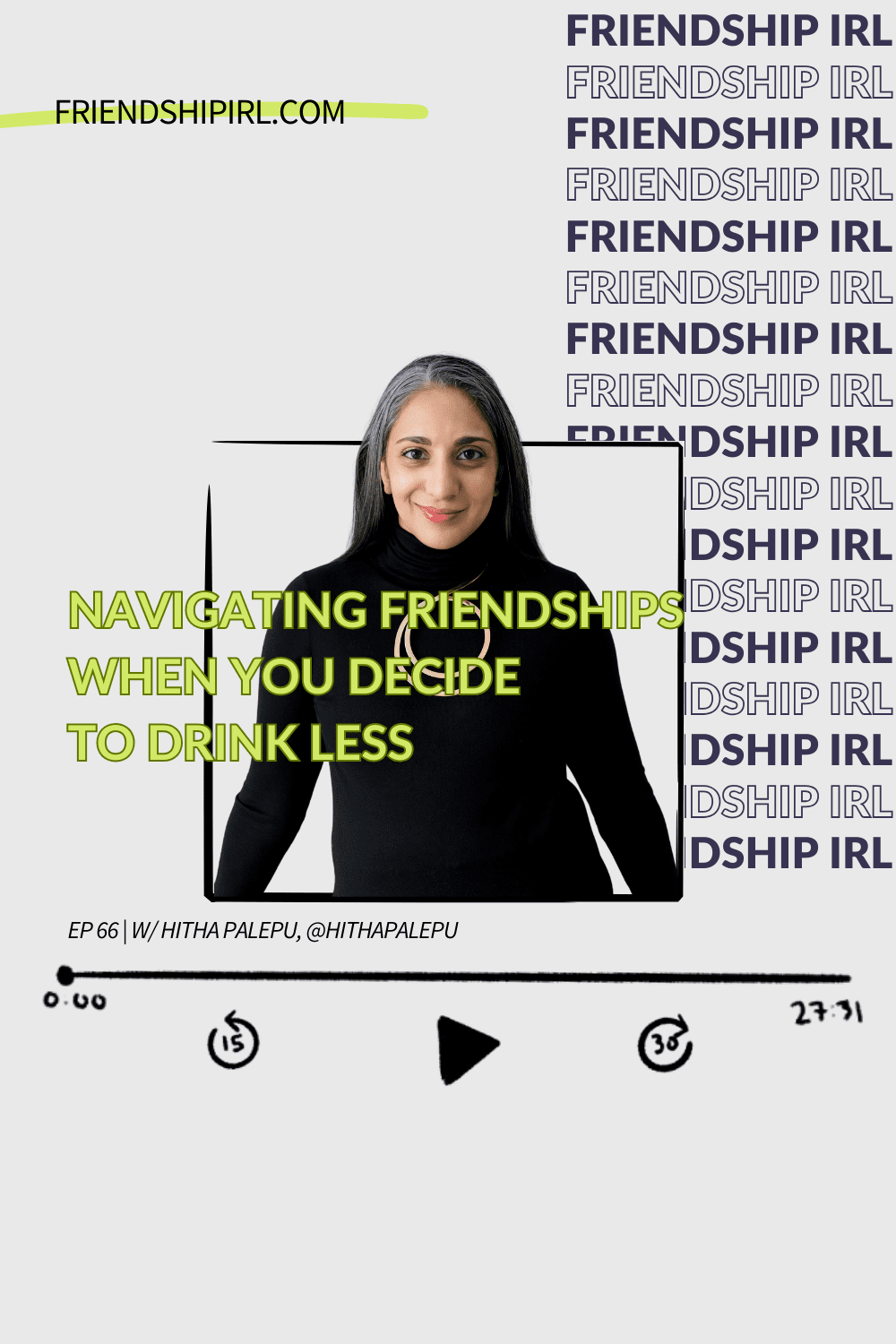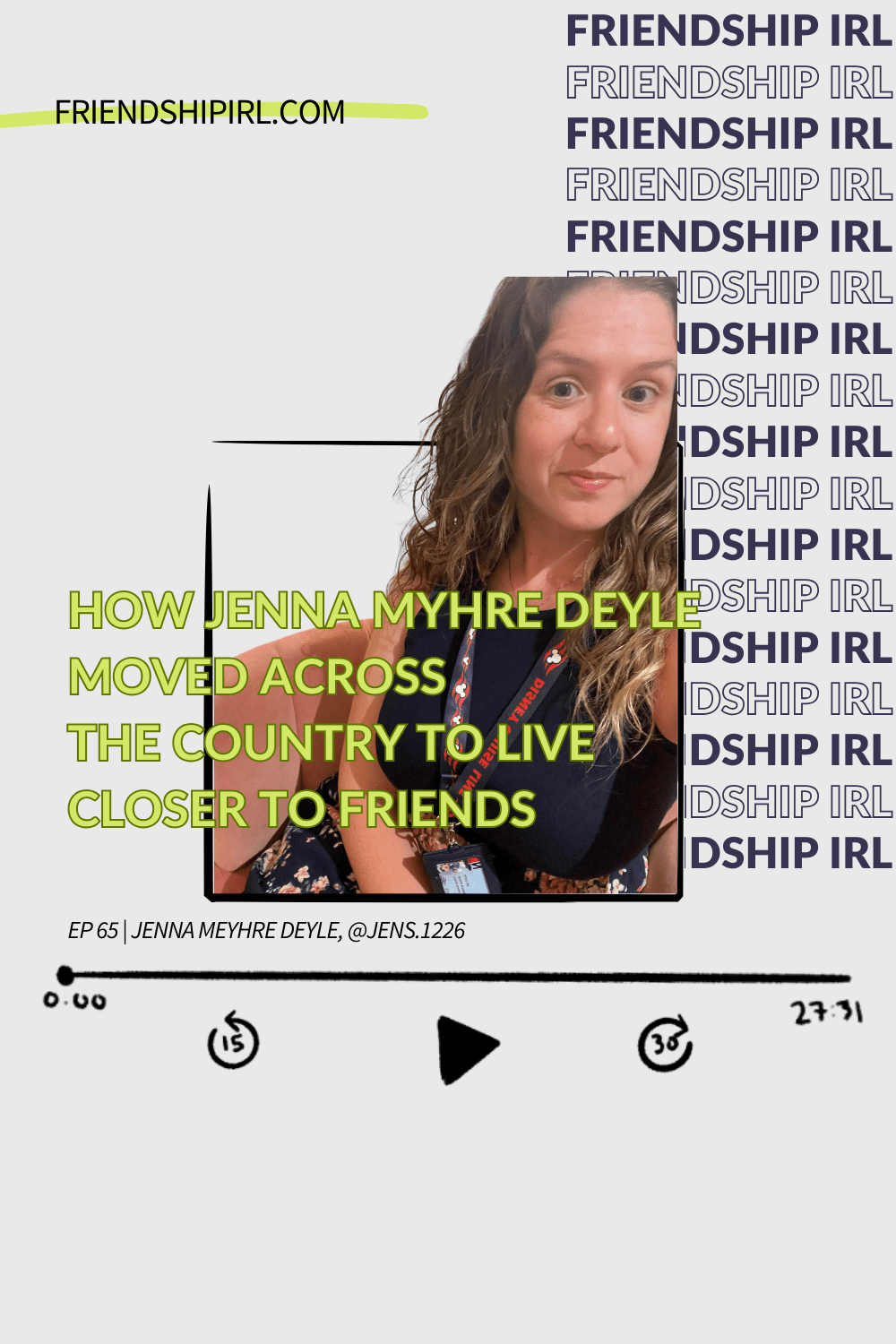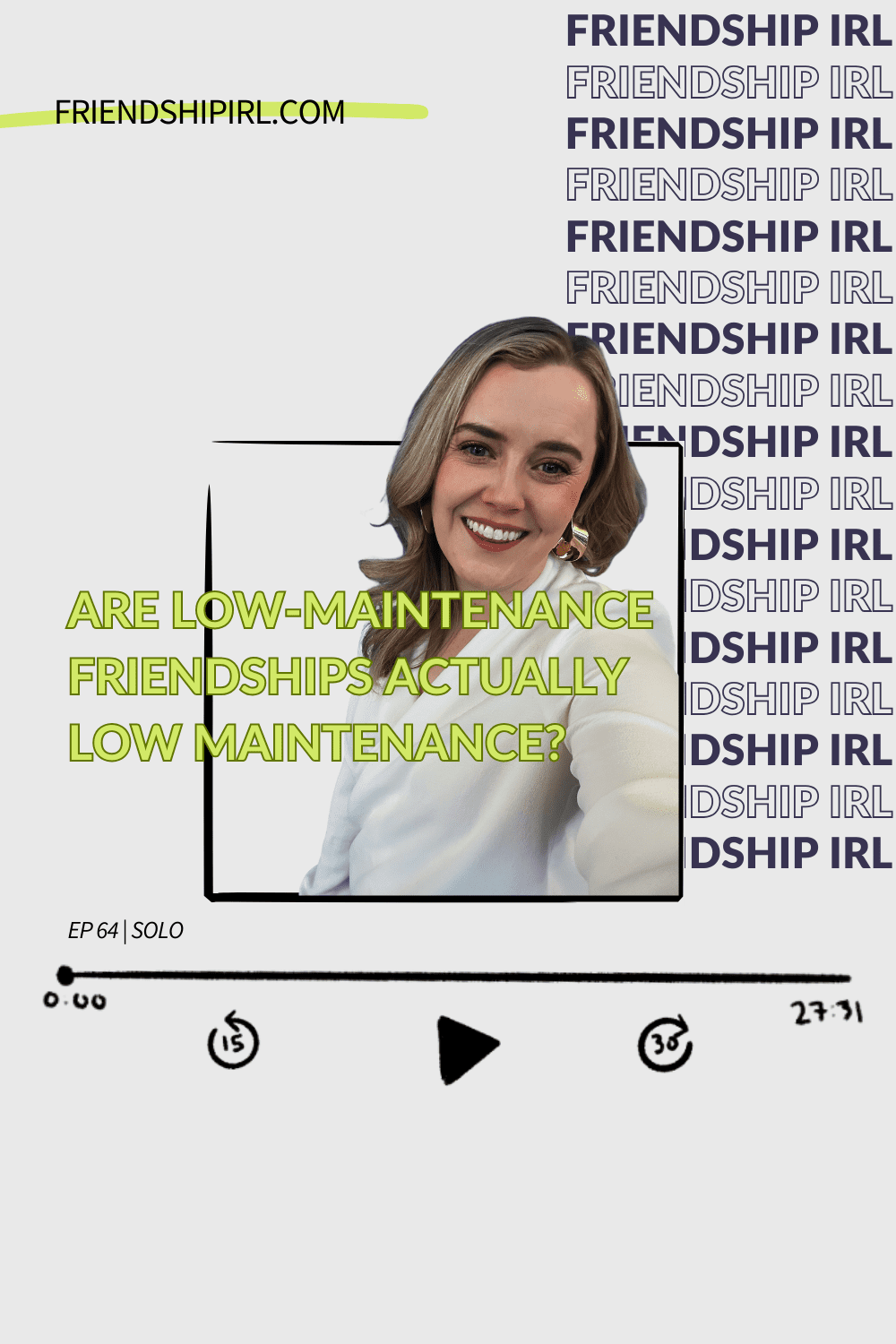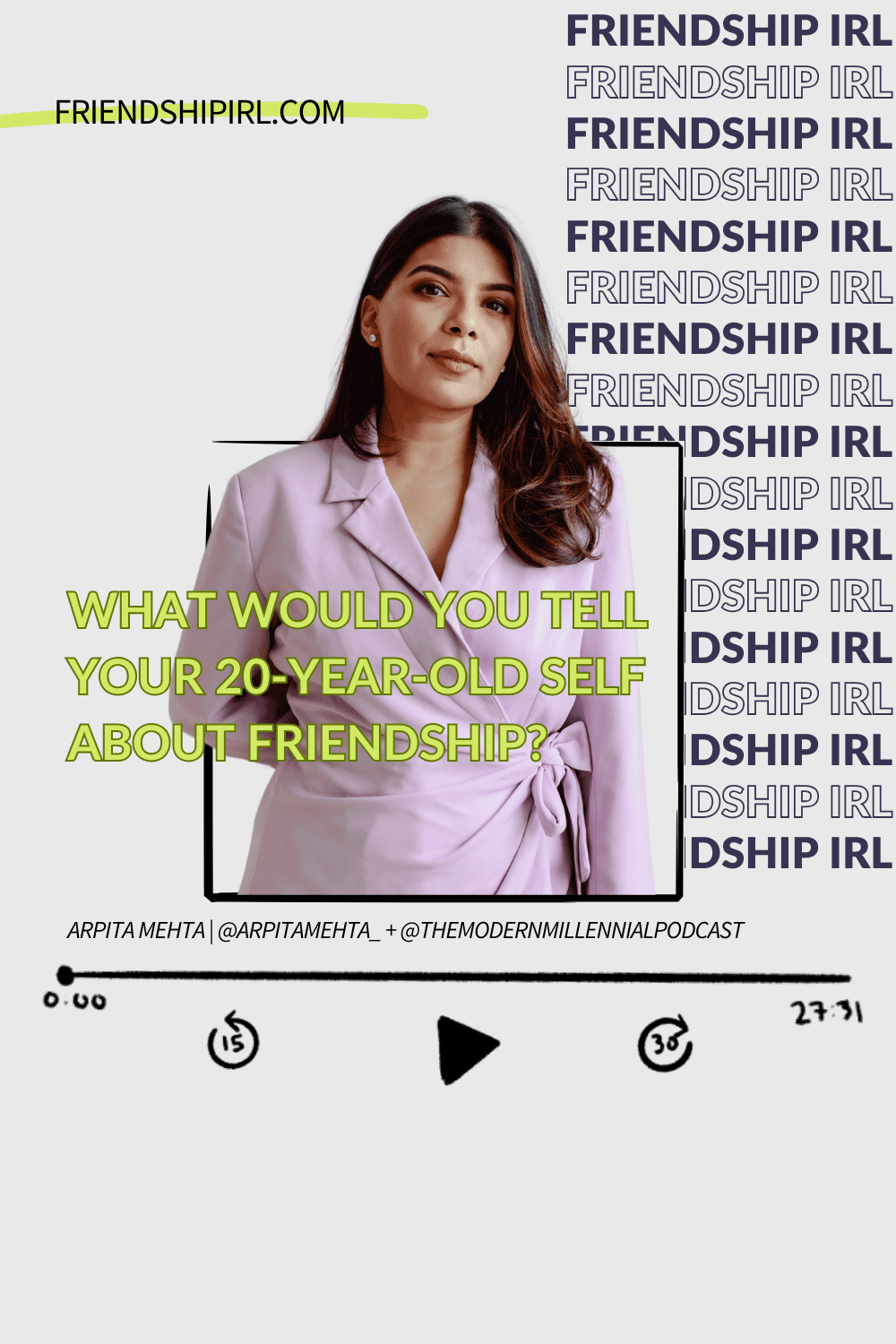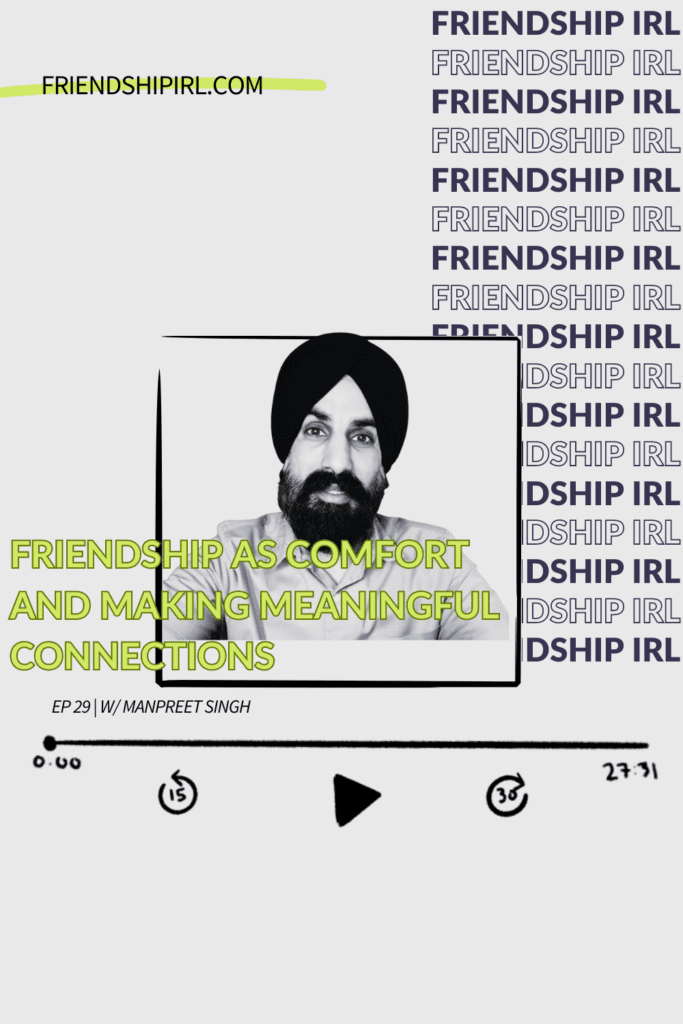
Podcast Description
Are you blocking yourself from making beautiful connections?
My favorite thing is meeting people I never would have met otherwise and today’s guest, Manpreet Singh is one of them. He wears multiple hats as a father, son, husband, and friend to many beautiful souls. His definition of friendship? Comfort.
This is one of those conversations where I really was IN it. Manpreet and I talk about breaking the ice when making new friends, the magic of “third places”, and what friendship means to both of us. There is so much to glean from this episode. I was expanding my own thoughts about friendship, people’s experiences, and am now thinking about it so much differently.
Friendship IS possible for all of us and building new connections and embracing the discomfort along the way is one of the most powerful skill sets we can have.
In this episode you’ll hear about:
- The beauty of meeting new people for the first time. It can be uncomfortable at first to break the ice, but there’s a secret to minimizing the awkwardness.
- Why friendship is all about unsaid “comfort” – it’s about being yourself, letting your guard down, and spending time together without needing to prove yourself.
- The all-too-common trend of blocking potentially incredible connections. It’s simply not true that your best connections are made in your first two decades of life.
- Why it’s better to loosen our expectations of friendship, co-create together, and just allow our friends to be there for us, even if we lose touch for years at a time.
- The scarcity mindset society has around friendship that is making us feel lonely.
- Bonding with friends when we’re going through our lowest points in life: divorce, heartbreak, financial turmoil. We can choose to stay open and vulnerable.
- The lack of “third places” that exist in today’s society and why that makes it even harder to form new friendships.
Reflection Question:
Manpreet and I both shared our definitions of friendship. What is your definition of friendship? What single word defines a friend?
Notable Quotes from Manpreet
“Friendship for me is comfort. When you’re around friends, you are just “in” your comfort. You don’t need to be anybody. You don’t need to pretend. You don’t need to prove anything. Either all your guards are down, all your insecurities are down. You can talk about anything – it could be your job, your life, your relationships. And that’s what friendship allows. When I am able to call somebody a friend, that means I don’t have any more guards. I can just be myself, and that comes from the comfort, that comes from that deep understanding. It’s not that we tell each other in communication, ‘okay, you can be yourself.’ No. It’s one of those unsaid things that you just find the comfort because you know they will understand it. They will understand when you say it, they will understand when you don’t even say things. And that happens when you spend time with each other.”
“The greatest friendships are built in divorce, of the times when you are broke, when you are heartbroken of a relationship, or you’re moving. You continue it when you have nothing to lose, and you are so down. That’s when you build big friendships. like you actually no other person because you see the reality you see yourself but you also the other person is also seeing your real there’s nothing put up. It just happens naturally, it becomes harder. This is what happened. Realizing that when you grow when you become successful in money, you close yourself because you build up the sense of losing something, right? And it’s becomes harder to make friendships and trust people because you create that fear of losing or that people will have agenda or what people will think for anybody if they are at a low point. Hopefully I can give you encouragement that this system was beautiful time to build friendships l
Resources & Links
Connect with Manpreet Singh on LinkedIn and YouTube.
Leave Alex a voicemail!
Real Connection in Real Life
@itsalexalexander #duet with @chelsbadger #longdistancefriendship ♬ original sound – muSlim Shady
@itsalexalexander Most people have some imaginary line for when someone is your friend” and your so focused on how far away you are instead of appreciating what that friend bring to your life. #friendshipcoach ♬ AaAaAaAaAaAaAaAaAa – cacaphobictortillaman
Until next time…
Take the conversation beyond the new podcast on friendship! Follow Alex on Instagram (@itsalexalexander) or Tiktok (@itsalexalexander), or send her a voice message directly.
Can I add you to the group chat?
Don't miss an update - Sign up for our weekly newsletter.
Episode Transcript
Podcast Intro/Outro 00:02
Alrighty, gang. Here’s to nights that turn into mornings and friends that turn in family. Cheers!
Podcast Intro/Outro 00:18
Hello, Hello, and welcome to the Friendship IRL podcast. I’m your host, Alex Alexander. My friends… They would tell you; I like to ask the hard questions. You know who I am in the group? I’m the person that’s saying, “Okay, I’m going to ask this question, but don’t feel like you have to answer it.” And now, I can be that friend for you, too.
Alex Alexander [Narration] 00:50
I know that a lot of people have a lot of feelings about the Internet, content overwhelming. Heck, I have feelings about this stuff. But sometimes I’m just so overwhelmed by how magical the Internet can be. And today is one of those days. I have mentioned this before, I think. I think I’ve mentioned this. There are, you know, we talk about groups and Facebook and how to put yourself out there. And I honestly have multiple episodes coming up about this, but somebody… actually Kristin Morrison, who was, I think, Episode 20. Kristin sent me this Facebook group. And she said, “, I’ve had a lot of luck in here finding podcast guests.” Now, I’ve looked in some Facebook groups like this before, and they’re not worth your time. They’re not worth my time. But I thought, okay, why not? Why not? And I put a little graphic together talking about friendship IRL. And the variety of topics I want to cover all related to friendship and community. And I posted it not having very high expectations. Within 48 hours, I had over 40 people message me, saying that they were interested in the podcast. And I proceeded to message them all back, set up times for discovery calls, where I could chat with them, see what they wanted to say about friendship and community. And in doing so, and putting myself out there, dropping this message being open.
Alex Alexander [Narration] 02:38
I have a slew of podcast episodes, I never would have had the chance to record people I maybe would have met, but very unlikely to have met in my lifetime. And now, I’ve spent over an hour talking to all these people, and having conversations that when you hear this conversation between me and Manpreet, I talked about wanting to have conversations like the ones I would have on my couch with my closest friends. And now here I am doing that with people that I was lucky enough to encounter. Thanks to this comment in a Facebook group. So just remember that when you listen to today’s conversation, I get to the end. And honestly, it’s a little overwhelming because this was one of those conversations where I really was in it. I was expanding my own thoughts about this topic, people’s experiences, thinking about it differently. And you’re getting to hear that live-ish. This is the kind of thing you would hear truly, if I got to sit down with Manpreet on my couch, and maybe someday we will sit on a couch together. I would love to do that and have more conversations. But man, the internet’s a wild place, and sometimes it does some good things. With that, let’s get to the episode. Hi, Manpreet. Thanks for being here.
Manpreet Singh 04:15
Hi, Alex. Thanks for having me. I just look forward to what unfolds. I’m always excited when I meet new people and having conversations on different topics. So I’m always curious what unfolds out of there.
Alex Alexander 04:32
Me too. I have had so much fun. That’s one of my favorite things about this podcast is just meeting people that like you and I might have run into each other, who knows, some point in life, somewhere. But my favorite thing is just meeting people I probably never would have met otherwise and talking to them on here.
Manpreet Singh 04:53
So true. Yesterday, first time I met… Just to add up to what you said. I met a few people in person that I’ve been connecting over LinkedIn, maybe more than two years. So there are people coming from Australia, somebody came from Manchester, Northern Ireland, London. So like, six, seven, who had never met before. And we didn’t know each other, there were common threads, there was one person who was coming from Australia, and we just met. And it was just seamless, because we’ve been interacting over the years on the poles and the DMS. And so, it was beautiful.
Alex Alexander 05:34
Yeah, I’ve talked about this before, you know, I think online is such a beautiful tool. And we can like build these connections. But there’s something so different about being able to take all the things we’ve learned about someone and actually sit in the, you know, next to them in front of them beside them. Like such a different experience, when you can make that happen.
Manpreet Singh 05:56
Definitely, definitely. It takes moments to break the ice, like you’re getting in your soul, and then finding that comfort just for a few moments. It’s like, the first time you’re having the Zoom call with somebody. But then after that, it’s just… it flows.
Alex Alexander 06:12
Yeah, I mean, I find that in every conversation, I was telling someone recently, you know, like when we meet somebody new, it’s uncomfortable for everyone. I’m a pretty extroverted person. So people always assume that I have some secret, or I can just do it. And I say like, “No, I just have convinced myself that whatever initial uncomfort there is, will pass. And the sooner I put myself out there, the sooner it will pass.” So you know, I’m not any different than anyone else. It’s uncomfortable to meet new people at the start for everybody. At first, like what do you talk about? Where do you go from here? What do we have in common? And the only way to fix that problem is just to start talking.
Alex Alexander [Narration] 07:07
I’m popping in early. Poppin in real early in this episode. But I’ve talked to a couple people about this now. So I want to drop it here for you. When I say like I’m an extrovert, everyone thinks I have some secret. I’m going to tell you my secret. Are you ready? This will work for everybody. It is uncomfortable, no matter what. The anticipation of walking into a room with a bunch people you don’t know, that awkwardness, waiting for somebody to talk to you. How do you join a conversation? It’s awkward for everyone, myself included. So here’s what I do. I try and minimize the amount of time between walking in the door and finding that first conversation. Because what I find is once you find that first conversation, it becomes way easier to move to other conversations to be introduced to someone. So from the time you walk in the door, instead of maybe hiding in a corner and surveying the land, or getting something off the appetizer table. If that’s the kind of shindig this is, instead of overthinking it, I just try and walk in and have the shortest amount of time. It’s almost like a competition with myself. There you go. That’s my secret. I hope it helps you too.
Alex Alexander 08:34
I’m so excited that you’re here today. When we chatted previously, I kind of asked you what you want to talk about. And you told me that when you think of friendship, there’s one word that comes to mind. And I was wondering if you’d share with us what that is and like why that word comes to mind when you think a friendship.
Manpreet Singh 08:55
Yeah, so friendship for me is comfort, right? When you’re around friends, you are just in your comfort. You don’t need to be anybody, you don’t need to pretend, you don’t need to prove anything. Either you’re just you, all your guards are down, all your insecurities are down, most of them, with the two friends that can happen. And you can talk about anything. It could be your job, your life, your relationships. And that’s what friendship allows. It allows to be you. That’s what I’ve seen in the friendships I had. Like when I am able to call somebody a friend, that means I don’t have any more guards. I can just be myself and that comes from the comfort that comes from that deep understanding. It’s not that we tell each other in communication, “Okay, you can be yourself.” No. It’s one of those unsaid things that you just find the comfort because you know they will understand it. They will understand when you say it, they will understand when you don’t even say things. And that happens when you spend time with each other. Right? I’m a firm believer… also a big part of it also happens when you meet people in person, you hold hands or you have some sort of physical touches. Doesn’t mean holding hands… you know, if you just guys by, you know, when the guys meet, they will still hug each other. They will hold…
PODCAST EPISODE! What is a Friend? and the 4 Types of Friends We All Have. Listen here.
Alex Alexander 10:28
Yeah, guys can hold hands, guys can put a hand on a shoulder, guys can sit side by side. Yeah.
Manpreet Singh 10:32
So that physical touch is a message it tells, I don’t know the science behind it, but I believe that you know something when you are able to touch the person, hug them, hold them…
Alex Alexander 10:45
I mean, even shake hands, all of them.
Manpreet Singh 10:47
Yeah. So that, for me, in a nutshell is comfort, that space that is created.
Alex Alexander 10:54
Now, what really stood out for me there was I talk a lot about how for a lot of people, I don’t think they can define what makes someone a friend or not a friend. You’re into a lot of people. It’s like, oh, they’re not my friend. And then I’ll ask people like, “Okay, well, what makes someone a friend?” And most of us don’t have a definition. So I think it’s, you know, I don’t think there’s one right answer to what is a friend, but you actually have some sense of a definition of what makes someone have that title or that feeling in your life. I think that’s really beautiful. Maybe whether you’ve spent time thinking about that, or it was a subconscious thing that happened. That I think is really a step beyond where a lot of people have gone. And it probably helps you to identify people in your life, that either are friends, or could be potential friends, because you start to see that glimmer of comfort. Do you feel like when you meet people, it’s helpful to kind of have this sense of what would make someone a friend in your life?
Manpreet Singh 12:09
It definitely does. And you’re right. I mean, like a) at first, most people do not… are not able to tell what makes friends or not. And I don’t think people decide. It happens very naturally. Like either somebody becomes your friend or doesn’t. And obviously, it’s their actions and inactions will they say what they don’t say. But underneath all that is vibrations, right? Underneath, what we see over here is just vibrations. We are vibrating at certain energy, when our energies match is when you make those people as friends. The only decision is, I think that helps is when you are going to in spaces and using, when you’re open to allow those vibrations, sometimes you can go with a really closed mind. And you’ll never make a mind. I can tell from my personal experiences, how many times I’ve walked into the meetings, because I have already preconceived notion of the person that is going to interact, whether it was a boss or some customer because of what I heard. And when I went with preconceived notions and the closed mind, I could never be friends with those persons. But when I went with… just open mind, not even thinking that I’m going to go with an open mind, I just go. Then the flow happens, then you can still have vibe or no vibe. Like you can reach the frequency. But you don’t have that decision to make. It’s just very natural. So I think from that standpoint, if I look back, I’ll give you an example. I moved to US when I was 23. From 23 to 33, for 10 years, I stayed there. So the most beautiful friendships I built was in that period because I was new in a country. I didn’t know anybody. I was, you know, getting my first job in the country. And the people around me were in the similar boats. And we caught on, we talked about the same things. How do we get the next promotion? And when we started working together that we would talk about what would we say in our appraisals and all those… And I’ve been in UK now for 10 years. But I don’t have the same friendships, unfortunately, that I built there. Because in some ways, I have restricted myself, like I go like this. I had to become like, my problems are my problems. I don’t want to tell others. Whereas 23 year old you can talk about any problem to all your friends like you’re very open. Yeah, I think that again comes from comfort. Looking back, I can say that’s how I found that. the reason those friendships I adore or I built was because there was comfort. And here I’m not open enough to receive that comfort.
Alex Alexander [Narration] 15:03
If you’ve been listening to all the episodes, this is a common theme, this idea that we are blocking ourselves from beautiful connections in our lives. This showed up in Episode 20, 21, 22. There will be endless episodes about this, because I think this is a really common trend, common occurrence, where things that we’re doing are cutting off the energy, the flow, the potential. And, you know, if we just think about it for a second here, it is really limiting to believe that we’re only going to make meaningful connections in our lives in the first half, in the first quarter, in the first couple of decades. If instead, we convince ourselves that we can make meaningful connections in our lives, all the way until our grave, that’s when it ends, is at the end of our life, then think about how much more empowered you would feel to walk into a new situation, to meet someone new. You never know which of those is going to be your next meaningful connection. And the ones that aren’t, you just let him slip past because you’re more focused on finding those new connections, that as Manpreet says, bring you comfort, then you are at the ones that just don’t feel right. You can let those slide on by.
Alex Alexander 16:46
I mean, I think there’s this interesting thing that happens, the older we get, you know, when we’re young, and you’ve just moved to a new country, you kind of expect that you’re gonna mess up, you’re gonna fail, you’re going to do all these things. And your friends are also doing that. So you’re all seeing each other, like the vulnerability of seeing each other fail repeatedly, really connects you with people. And the older we get, the more we want to look like we know what we’re doing, that we have our life together. And so we’re less likely to share our failures. And the more we hold those back, the more other people hold those back, right? Because if I hold it back, then it looks like I have it together. So you don’t maybe want to admit that you recently had a failure. So I think what you’re talking about is a really universal experience for people like trying to make friends as an adult. And I know for a fact that I’ve had friends who have told me, you know, like a big reason they love our friendship, being friends with me, is because I really do, try and stay open about the things that aren’t going well. Not in like a negative way or in a… even like a I’m not trying to dump it on them. I’m not trying to vent or rant. It’s more just kind of a fact share. Like, recently this thing happened. And I messed it up and doing that create space for them to start admitting what’s not going well for them. Yeah, I think that’s a big piece of why friendships feel so different the older we get.
Manpreet Singh 18:36
You’re right. If we keep ourselves open, in these new times, not new, but as we grow older, not close our minds, and more importantly, not close our hearts, because that’s what we do, right? We pretend like you cannot fail. And you know, if you’re failing, you don’t need to tell. Because then it makes it bigger, and you’re afraid of being judged. If you’re able to keep that open, at least not with everybody if you know but with people you have comfort. In some reason, it keeps coming back for me. It’s always comfort, right? Then you’re able to cherish those friendships even more. And that’s why I, 10 years after moving from the US, if I have a problem, I would call somebody there. I know I can rely on. They will do… all of my childhood friends that which are not many that are, I’ve been in touch with that are in India, and I’ll call and I’ll talk to them. It’s trying to remain open. I’m learning to be open again with the people that I’ve built relationships. But they are more… I wouldn’t say I took them to the level of where I could go where I can be really open so I’m learning to show them the parts that I thought I don’t want to show them because I was afraid of being judged.
PODCAST EPISODE! The Art of Making Friends. Listen here.
Alex Alexander 20:04
I mean, the beautiful thing is, I think that any friendships we have, they aren’t stagnant. So if we make the choice to start being more open. That’s probably what happened when you went to the US, you had no other option. You had to meet new people, you had to choose to do this.
Manpreet Singh 20:23
I didn’t even know. Actually, it was not a conscious decision. It was just… you know, you’re in that age that you don’t know what you don’t know or how you should behave. So it was one of those like, I didn’t know anything different. Whereas 44 years old, now I have learned the behavior that society says, okay. Now you’re grown up. Now you should be doing like this. I’ll tell you something just happened today. My daughter came back from school, and I was just having fun and being silly with her. And she’s like, “I know, you were really naughty when you were a kid.” And I was like, “I wasn’t.” She didn’t trust me. She called my mom in India, and asked he, you know, if I was really naughty kind of child I was, and she couldn’t believe. But now I am learning… you know, just being kid. It’s not being naughty, but just being cared and doing things that probably I didn’t do. And I don’t know why I didn’t do then. But it’s ever evolving. Relationships, friendships, and it’s my way to be able to build a relationship with my children.
Alex Alexander 21:34
I think that so much of what I talked about on here with friendship really just applies to all relationships. I talk about friendship and community because I think those are… well, society says those are the lowest on the priority list. You know, family and romantic relationships come above these, which is why I really champion these, but, you know, that ability to act like a kid and not put a mask on all the time. They enrich all of our relationships, any of them, even the ones with your… your daughter, right? Where like, no, this is really me. But somehow I’ve gotten to this point where I’m just following, like, society’s narratives. But really, at my most childlike core, this is how I acted.
Manpreet Singh 22:26
I was reminded, I don’t know if you know Rumi, was a poet.
Alex Alexander 22:31
I do know Rumi.
Manpreet Singh 22:33
Yeah. So here’s a quote, it says, ‘I love my friends not with my minds, or not with my heart.’ I’m paraphrasing, I may mess it up. ‘I love my friends, not with my hearts, not with my mind. Because my heart might stop. Mind may forget, but I love them with my soul. Because the soul never forgets.’ I thought, you know, that was very relevant to what we are saying that somehow on another level, at a spiritual context, we are connected as a souls we have been in this communication or this relation or interaction, many, many, many lives before then we never forget somehow. We forget the context. But we do not forget how we felt.
Alex Alexander 23:25
Yeah, the idea of friendship and feelings, like how we feel when we’re around these people. Funny that you’re saying that like keeps coming up in conversations that I’m having recently. Which honestly comes back to that comfort idea. You use the word comfort, if I had to pick a word for friendship, mine is security, safety, price security, something in that sense. And part of that has to do with my own background, but another piece of it just has to be that my… like friends just allow me to be me. They don’t have expectations on who I’ll be someday. And if they do, it’s just like a slight picture. You know, they’re kind of dreaming with me. They don’t, they don’t have all these hopes and expectations. But they’re just there. Right? I can always go back to them. I can always call them I can always come and tell them that I’m a new version of me. It’s like less of a fight. Every time I become a new version of myself, versus maybe my romantic partner or my family, who had all these expectations, because their life is so intertwined with mine. Like we’re, we’re making decisions together, but my friends and I aren’t doing that. So it’s almost like less pressure with every transformation. And I know they’ll be there through those.
Manpreet Singh 24:56
Yeah, it’s not as transactional as other relationships can be, right? It’s… a lot of relationships become transactional, because just of the nature of the relationship, you have expectations, right, and expectations, create those transactions. But with friendships, the only expectation you will have is that they are there. that’s it. You know, and sometimes you don’t even care that they are there like for years, you wouldn’t talk to a friend. But back in your head, you know, they’re there. Like 10 years later, you will pick up and you will start from where you left 10 years earlier. Like it will be like, nothing . This is what I found when I went back to India, after 10 years of meeting my friends, it was like those moments and we talked about those things we used to do in our lives. And it was just like, I never left.
Alex Alexander 25:47
I was just thinking it’s funny. You and I are talking about this as if, right, the expectation is just that they’re there. And I think you and I agree that that’s beautiful. Like the simplicity of that is so nice, but so many people, because there isn’t these set expectations that you might have with a spouse, and a co parent, and your finances are mixed. Like you are very set understanding when you make this agreement of what this relationship looks like. And I think a lot of people struggle, like they want to control the expectations of their friendship more. And you and I are sitting here saying like, it’s beautiful, that there’s really no expectations except just to be there. And I think a lot of people are gonna listen to that, and panic a little bit. Because people are really trying to force friendships, to have like, so many expectations.
Manpreet Singh 26:46
Yeah. And this reminded me of a funny incident. You know, if I was in that mindset, I would still say I expect, even though you don’t have expectations is you expect your friends to be there and stand by you in a way. I’ll tell you how. Som I liked a girl. And it was just like common friends. Not common, but we knew through business association. And so I knew her and my very good friend, my best friend knew her. So we’re like newer, and then things didn’t go the right way. You know, I like her and she stopped talking and she just blocked me and whatever, right? That’s beside the point. What happened was my friend was still talking to her. And in my mind, I was like, how can you talk to her? Like, if she didn’t talk to me, like if she said no to me, you cannot have you her in your life. Like you cannot be meeting. Obviously, that was part of immaturity.
Manpreet Singh 27:49
Yeah, we’re young. Yeah.
Manpreet Singh 27:50
Yeah… me being angry of not reciprocating, that she didn’t say yes or the way she interacted. So I never told this to my friend. But I say that with, you know, humility, or a lot of love. And I say there is no expectation. Yes, there are certain expectations like this, that you want your friends to stand by. But if it was to happen now, I would be more open to tell him, you know, what happened, whatever. This is what I expected, not that it would have changed, he would still talked. It doesn’t make sense, it’s not mature for me to shut down the relationship just because you cannot get along. All he made sure that we were not in the similar place at the same time. You know? So yeah, expectations can a lead like that also, when you are not… when you are a little too young, gotten properly mature in a way in your thinking.
Alex Alexander 28:50
And that’s not to say there’s no expectations in friendship, I think that the beauty of friendship is you can co create your expectations with this other person, and they don’t need to be all consuming. They really can be simple, or they can be complex. But you know, the joy is if they’re simple, it’s easier to meet simple expectations. Like I talk about that a lot. People will say,” Oh, they’re my best friend.” And what that means, the actions and the expectations, that is so different. And although there’s a lot of societal messages, and like pop culture and mass media that have kind of tried to feed us expectations, is that really the reality for people? And then we’re trying to force it. So if you go in I think from this like simpler place, you’re gonna have conversations and develop more expectations. But that’s kind of the beauty is it’s easier to be yourself I think, because there are less expectations placed on you then other relationships in your life.
Manpreet Singh 30:02
I agree with this. I never understood the thing like best friend, I never could understand like, how can I only have one best friend like I… So I just have friends, and they are best at what they do and who they are. So I don’t have just one best friend, I have best friends.
Alex Alexander 30:23
When somebody tells me somebody is their best friend, and they’re mad at them, my response is generally best friend for what? What are they your best friend for? Because there’s normally a couple of areas where that person like really shines. And what often happens is that the person is mad because they have an expectation that this friend would show up in all the ways, but if they look at it, really they’re really good at showing up in a few ways. And this is not one of them. And now they’re mad at them. And then you know, we’ll talk through it and somebody will say, oh, yeah, normally I go to my coworker for that. You’re right, it’s kind of maybe not something I should have expected them to have. Like, I don’t really like the term best friends. But that’s my general question to people. Like best friends for what? Who are they your best friend for?
Manpreet Singh 31:21
Yeah, I want to ask you a question. You know, since you created the show, and you probably don’t get that much opportunities, what is one thing you want? And obviously, you may have said it in different times. But if you were to give one single message that people saw through your lens, like through you, what would be your message on friendship? Like you mentioned security, but, you know, maybe in a few sentences, what does friendship mean to you?
Alex Alexander 31:50
I want people to see friendship as possible. I think that there are a lot of societal messages out there telling us how hard friendship is how rare friendship is. It’s like a scarcity mindset. There’s a lot of fear around friendship. And I actually was out the other night at a brewery here in Seattle. And I walk in the room. And this restaurant is full of tables, with people sitting with groups of friends. And I look at that, and I have a moment where I think to myself, do I really need to be doing this work? Do people really need this? But then I get messages from people in my DMs and my emails, voice memos that are like, the saddest messages people just… I had somebody messaged me the other day that said, you know, “Have you ever considered that friendship really just is that hard?” And I said, “I don’t think that it’s easy. But I think we’re making it harder than it needs to be.” The messages that society is telling us are setting these like expectations that just aren’t realistic, that’s leaving us lonely. We feel like we’re the only ones because if you feel lonely, and then you walk into that brewery, and you look at all these tables of friends, and you didn’t have someone to call, you’re wondering how… like, why you? Why can’t you find friends? So, you know, with the podcast, it’s great because we’re sharing these stories of real experiences, of how things are working for people, but also times where it doesn’t feel good. And trying to like normalize the whole spectrum of experience so that people can see that it is possible. And maybe it’s not necessarily easy, but it’s just like a bunch of small actions built up on each other that build these relationships in your life.
Manpreet Singh 34:04
Yeah, I absolutely agree. I mean, this whole frame that society or our culture systems have created with what is supposed to be hard and what is not is just you know, I just feel like it’s so full of BS that people need to call it out like you know, the other thing in comparison for that is work, right? We have trained from the beginning that all you need to work hard to get successful, right? You could be telling our kids you need to do your work happily, joyfully. It’s not the effort that isn’t questioned. It is your attitude. Because when you are already creating that projection that work is going to be hard, life is going to be a hard, relationship is going to be hard. Now we’re going to go with an ease… sense of ease. Your sense of ease is when you don’t have any preconceived notions. You’re just going and doing it. The reason anything is hard, is not actually because it’s hard or anything, it’s, it’s because it’s unfamiliar, like when you get into unfamiliar territory is, it’s gonna seem hard. But it’s only seeming hard the very first time, the second time it is a little bit better third time, fourth time. And you know, just like everything we learned in our life, I think that that word hard, I think if we took it out from dictionary, it will be so much better for everybody. Like, imagine everywhere the word hard is used in a context, if you remove that, all of a sudden, it’s gonna be a very different world.
PODCAST EPISODE! How to Make Friends as a Grown-Up. Give it a listen!
Alex Alexander [Narration] 35:45
You know, Manpreet’s word was comfort. Mine was security, stability, whatever your word is for friendship. Listening to him just now talk about how we should remove the word hard from the dictionary. And, you know, he just said, the very first time you do something, it is the first time, it’s unfamiliar. It’s not hard, it’s unfamiliar. The second time, it’s a little bit better, then the third time, the fourth time. And it’s just like everything else we’ve learned in our life. And when you think about that, with the words comfort and security, anything that is comfortable in our lives, is only because it’s familiar, and we’ve done it so many times, it’s our normal. The same with security, anything that’s bringing us security in our life is because we’ve built a stable foundation. So I’ve talked about this before, this idea that quite often, I think, when it comes to friendship, we want the end result. And that would totally make sense as adults, because you have friends that you maybe have had for decades, who feel comfortable and secure. And that’s what we want, we want more of that. But we forget that there was an entire journey that built those friendships into what they are today. And we actually loved that journey. Normally, we find it endearing to look back on those memories and those moments, and we wish we could go back. And the picture that keeps coming to my head is when I lived with my friends C. Hi C! In college and we just kind of like moved in together, we actually moved in together because we didn’t want to live with our best friends, which is now a funny joke. And we would sit around on the couch, and we’d have awkward conversations. And we’d have to figure out who each other were, that is so beautiful to me. I would love to go back and do that. And maybe I find it beautiful now because I know what the end result is, which is our very beautiful friendship that I feel so stable and secure. And that it could make me cry right here on this podcast just thinking about it. But it was the journey. So as adults, I get it, we don’t want to go back to something unfamiliar, which is why I talk about friendship as habits and skills. Because I do think if we get back into this mindset that we have to put ourselves out there and meet people, that we’re not done making these connections. We can become comfortable with the skills and the habits of putting ourselves out there. Like this is our new normal to feel this way to walk into the party and try and have that first conversation as quickly as possible. But no matter what, getting to know someone is going to be unfamiliar in the beginning. It’s not going to be necessarily comfortable or stable and secure. But that’s part of the journey. That’s going to get us to that friendship. And looking back, we’ll see that is beautiful. So we need to see this beautiful now, even at its awkwardness and unfamiliarity and discomfort. Yeah, I mean, if something’s hard, you’re already have built up this wall that you feel like you have to climb. And I really think that friendship and community involves skills and habits that we just really aren’t taught. So you don’t know how to do it. And a lot of what’s celebrated in mass media are these big, sweeping actions. When in reality, friendship is built on a bunch of small moments and actions. So it just feels like all these barriers that people don’t even want to start. Then you want to start and societal messages, don’t tell them that this is an area of their life, they can really impact. So that’s just another reason. I compare friendship quite often to like any big goal, if you want to change your financial situation, if you want to… here’s a real life example for me. Okay, so I am 33. And until this year, I had never learned how to lift weights. As a coxswain, like the person that steers in the crew team and yells, I wasn’t allowed to lift weights in high school and college. I know that’s silly to anybody listening. But that’s just the reality. I wasn’t allowed. So I never learned. I was around it all the time, but I never knew. And then I would go to the gym, and swim and run and do yoga. But I would stand in the weight room and look at these machines and the racks of weights and just think like, I don’t even know how to pick that up. And do I turn my hands at 90 degrees? Do I stand up? Do I lay it out? Like I know nothing, right? So I had put this off, over and over and over again. But it felt like this thing I really wanted to learn. So this last November, we joined a gym, where it’s very, very small groups, and they coach you on the actual proper form and things like that. And the first month that I would go, my husband and I would go together. And we would leave every time and he’d be like, “I don’t know why you keep going. You seem so unhappy to be there.” And I just kept telling him, “I am learning a new skill I don’t know how to do. I’m not very strong. And this is uncomfortable. But I know that long term, this is something I want to know how to do. So I keep going. But you’re right. I despise it every time.” And now it’s April. So I’ve been going for five months. And I see the difference. I start to like know what I’m doing when I go, I have learned this new skill set. And I really think friendship and community is similar. Like it’s so uncomfortable to put yourself out there in the beginning. But over time, you start to trust that when you go places, you’ll meet people and you’ll connect with the ones you’re meant to connect with. And the other ones, it was nice to meet them and you’ll move on. And you’re just like trust yourself that you can do this, that you can build connections around you. I think that’s a really powerful skill set to have in a world that tells you, you’re just supposed to go it alone.
Manpreet Singh 42:52
That’s powerful. And congratulations on trying to weight lift again. You know, even after watching it for years now not being expected, and taking it on. Because sometimes you can just easily make an excuse and go. And as you were telling the story, I was thinking of two things. One, that if we are not taught anything, we are very natural at making friends. Like you put two babies together they will… two children together. There’s no boundaries, there’s no agenda. So we know that inherently we know how to make friends, is when you forget, as we grow society, we close ourselves. But the other thing I was reflecting upon is the greatest friendships are built in divorce of the times. Like when you are broke, when you are heartbroken of a relationship or you’re moving you continue it… when you have nothing to lose, and you are so down, that’s when you build big friendships like you actually know other person because you see the reality, you see yourself but you also the other person is also seeing your real. There’s nothing put up. It just happens naturally, it becomes harder. This is what happened. Realizing that when you grow when you become successful in money, you close yourself because you build up the sense of losing something, right? And it’s becomes harder to make friendships and trust people because you create that fear of losing or that people will have agenda or what people will think. For anybody if they are at a low point, hopefully I can give you encouragement that this system was beautiful time to build friendships, like the friendships you build now, I don’t want to compare but it will be something that you will cherish a lot more than any other friendships or any other times because these are real bonds with the people who are being real with… at that point of time. So, cherish those moments.
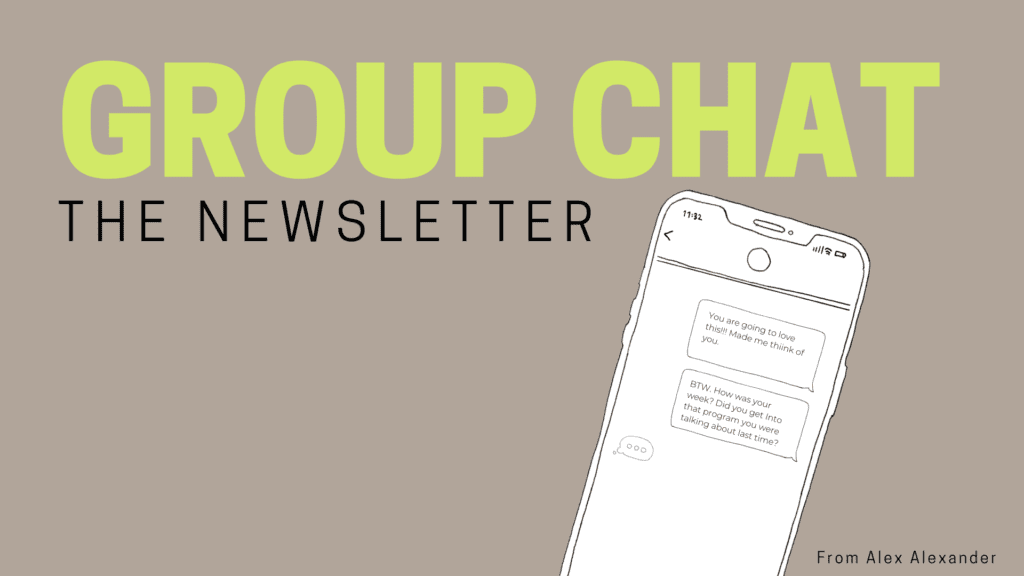
CAN I ADD YOU TO THE GROUP CHAT?
DON'T MISS AN UPDATE - SIGNUP FOR OUR WEEKLY NEWSLETTER.
You’ll get the full scoop on everything we’ve been up to in the last seven days – podcast episodes, blog posts, and updates, plus an exclusive note from Alex every week with her latest, unedited thoughts.
Alex Alexander 45:04
I would venture to say, yes, I totally agree. But I would add too, right, we can choose to stay open and stay vulnerable. And like, no, you know, making a friend in your lowest point who helps you get out of that as like a special type of bond, you’re never gonna forget. But we can still choose to do this. And I think you’re totally right, that I tell people is also there is a structural component to why this is hard. And that is why we need the skills and habits. If we were to change some of the structures, and I have more podcast episodes in the works on this, but if we were going to change some of the structures, the skills and habits wouldn’t be so necessary, because we’d actually be around people more often, but because we live in our houses, disconnected from one another, like we, unfortunately do have to work harder, I think, than we would have these structures weren’t in place.
Manpreet Singh 46:18
Yeah. Would you want to give any example? Because I don’t know, what structure or what could we do differently to build it… because it’s not seen as a skill. I’ve never heard somebody else say friendship as a skill, which it is.
Alex Alexander 46:32
Yeah, they’re not. People are not. You are very right, Manpreet, they are not. So right, the friendships that we make quite often more younger, like you said, put two babies next to each other. A lot of our friendships, when we’re younger, our friendships of proximity. Your kids go to school, and they see the same people every day. You, as the parent chose the area of the world you live in, the neighborhood you live in, the school your kids go to, so you have chosen their area of proximity, but they go there every day. And they make friends. And that’s a beautiful thing, they will naturally do that. The older we get, we have more freedom to pick the people we surround ourselves by. But in order to do that, we have to put ourselves in the places where those people are. So if you have an interest in something, you can go to a place or join a group, find a community and you can be there and meet people, kids don’t often have that choice. So that’s what I would say by that’s like an example of a habit or a skill, like choosing to put yourself in new places to meet people who will connect with you on interests, that maybe, for example, creating a YouTube channel, you know, maybe you have some other friends in your life that have similar interests. But if you don’t, you can join groups and meet people. I mean, I’m a great example of that, right? We connected over podcasting. We have more choice, that’s an example or… skill, when you’re talking about structures and I have a whole episode in the works on this. But there’s something called third places. So I mean, in the olden days now in the… in the mid 1900s, most people would have their home, and they would have work. And then they would have what’s called a third place. So a park or a library or a community center or a bowling alley, a mosque or synagogue or church, they had these places that they would go where they would frequently see the same people. Yeah, and a lot of people nowadays have lost third places. And a big piece of that, when I say structurally, is actually building codes. Like I’m truly talking like structurally, right? We have voted out community centers, we don’t allow mixed use housing in certain places. And if there was, you know, more, maybe apartment buildings in a suburb, you would need a park because those people don’t have a yard. And then everyone could meet at the park. But we voted those out. So there really are like these structural components that exist that make it so that we have to work harder to make these connections in the world right now.
Manpreet Singh 47:08
That’s brilliant. I never thought of it like this.
Alex Alexander 49:26
Yes. So the hope is more conversations like this will show people the variety of ways this can look in their life. You can choose what to do with that there’s no right way.
Manpreet Singh 50:03
I agree. And this is great. There are so many things I learned just by this conversation being here. Because when you are used to making friends, you don’t see the other perspective. You have to have these kinds of conversations to be aware of the different perspectives of people and seeing through their lenses rather than your good old lens that you’ve been living with all your life.
Alex Alexander 50:29
Exactly. Manpreet, thank you so much for coming on the podcast today and chatting. I’m really excited for people to hear this episode. And I appreciate you being here. And just like be willing to have a conversation and see where it goes.
Manpreet Singh 50:45
Yeah, no, it was wonderful. Thank you for having me. And I hope people pick up the ideas that you pulled in. And I also would be curious to see your episodes where you’re gonna put down the structure and example able to use, so I’m gonna look forward to listening to those. Thank you.
Alex Alexander 51:08
They’re in the works. I promise they’re coming.
Podcast Intro/Outro 51:12
Thank you for listening to this episode of Friendship IRL. I am so honored to have these conversations with you. But don’t let the chat die here. Send me a voice message. I created a special website just to chat with you. You can find it at alexalex.chat. You can also find me on Instagram. My handle, @itsalexalexander. Or go ahead and leave a review wherever you prefer to listen to podcasts. Now if you want to take this conversation a step further, send this episode to a friend. Tell them you found it interesting. And use what we just talked about as a conversation starter the next time you and your friend hang out. No need for a teary Goodbye. I’ll be back with a new episode next week.

